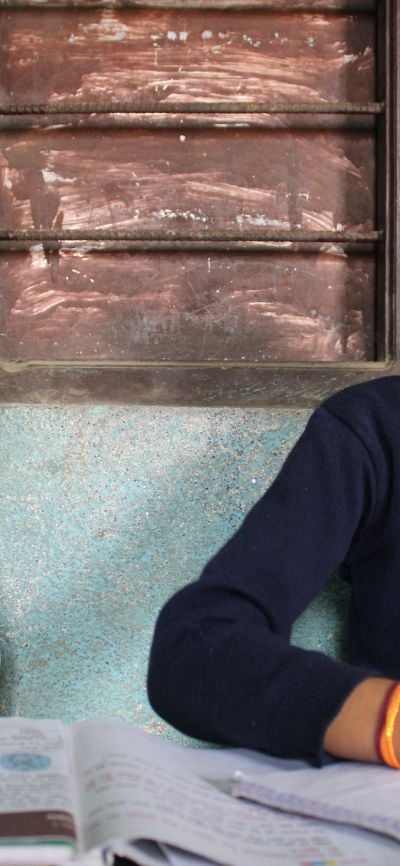Sundari is 11 years old. She has an intellectual disability, with some learning and memory difficulties. She goes to school like any other child, thanks to Humanity & Inclusion (HI).
Sundari wants to become a doctor
Sundari is in 5th grade. She lives in the school and sleeps in the dormitory, as her village is 100 km away.
Her favorite subject is science. One day, she made a presentation to her classmates in which she drew an animal cell on the whiteboard and talked about its different parts.
“I want to become a doctor one day to save people’s lives and help the elderly.”
Sundari
Bipana is Sundari’s best friend
Sundari is always with her best friend, Bipana. Bipana tells us about Sundari:
 "Sundari is very open and friendly, but she sometimes gets angry and I don’t like that. But I can calm her down really quickly."
"Sundari is very open and friendly, but she sometimes gets angry and I don’t like that. But I can calm her down really quickly."
Ludo is Sundari’s favorite game. She loves to play this board game with Bipana.
The resource class
The resource class in Sundari’s school caters to 30 children with disabilities. The teaching is adapted to their disabilities. They are taught the basics: The Nepali and English alphabets, numbers, words, body parts, as well as hygiene and self-care. When pupils are considered ready, they can join a mainstream class.
“Sundari was enrolled in the resource class – a class where children with intellectual disabilities study together - when she was 5 years old. She was enrolled during her early childhood development years and has since progressed to mainstream classes. She is now second in her class.”
Bhupendra Khadka, her teacher
Children in resources classes range in age from 7 to 17, with some even in their 20s. Like Sundari, some of them may transition to mainstream classes in the higher grades after a few years in a resource class.
HI supports 50 resource classes
Over the past four years, the school’s resource class has been supported by HI and its local partner HUSADEC (Human Rights, Social Awareness and Development Centre). Resource classes welcome children with a range of disabilities, including sensory and intellectual disabilities.
Only 380 of Nepal's 30,000 schools have resource classes and HI supports 50 of them, providing educational materials adapted to the needs of children with disabilities, including braille books or sign language learning mobile applications. Other support materials include foam letters, magic balls, word cards, soft balls, storybooks in local languages, stationery, and so on.
HI also provided hygiene kits and school bags to 500 students with disabilities in 46 resource classes across 10 districts to help them continue to learn during the COVID-19 epidemic in 2020-2021.
HI has also trained teachers to adapt their teaching methods to the needs of children with disabilities.
Acceptance of children with disabilities
Uttam Prasad Bhattarai, the headmaster of Sundari’s school, explains that in rural villages, acceptance of children with disabilities is difficult.
“There is a social stigma associated with disability. When children with disabilities, especially intellectual disabilities, enter a mainstream class after their entrance examination, some parents of children without disabilities are reluctant to send their children to the school. Children with disabilities tend to enroll in school at later ages than their peers and so are older than their classmates."
Mr. Bhattarai
HI and its local partner continue to fight for access to education for children with disabilities.
Thanks to USAID
The resource classes have been supported by HI and its local partner since May 2018 as part of the Reading for All programme. This programme is made possible by the generous support of the American people through the United States Agency for International Development (USAID).




